Suhrkamp
The publishing house Suhrkamp, Berlin (until 2009 Frankfurt am Main), is one of the most important publishing houses in Germany. Founded in 1950 by Peter Suhrkamp, the publishing house built up an impressive selection of titles by German and international authors in the second half of the twentieth century. In 1960 the publishing house Insel became part of Suhrkamp. Between 1959 and 2000, Siegfried Unseld was the head of Suhrkamp. During this period of time, literature from Holland and Flanders was also welcomed at Suhrkamp.
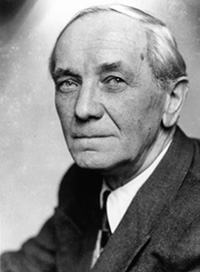
Peter Suhrkamp's career as a publisher began at the publishing house S. Fischer in 1933. Having started as an editor-in-chief, he soon became a member of the board of directors. In the mid-1930s, Gottfried Fischer moved to Vienna with his publishing house’s "non approved" authors. Peter Suhrkamp took over management of the rest of the publishing house. In 1942 the publishing house was renamed Suhrkamp. vorm. S. Fischer. In 1950, Peter Suhrkamp established the publishing house Suhrkamp, taking a number of authors from S. Fischer with him. One of these authors is Rudolf Alexander Schröeder, a connoisseur of the literature of the Netherlands and Flanders. In the years after the First World War, he translated poetry by Guido Gezelle and Karel van de Woestijne as well as prose by Herman Teirlinck and Stijn Streuvels for the publishing house Insel. Furthermore, he was also familiar with the older literature of the Dutch language area. In the early 1950s Suhrkamp republished Schröeder’s collected works and of his two collections Auffsätze und Reden which included translations of a number of poems by Dirck Rafaelszoon Camphuysen, and poetry by one of the great poets of the seventeenth century: Joost van den Vondel.
In 1962 Hans Magnus Enzensberger became an employee of Suhrkamp. Enzensberger, who had previously published the first German translation of poems by the great expressionist poet Paul van Ostaijen in his book Museum der modernen Poesie in 1960, devoted an entire issue of his bilingual series to the work of Van Ostaijen in collaboration with Klaus Reichert (who later translated Schlachten by Tom Lanoye) in 1966. A year later Van Ostaijen's Grotesken, in translation by Gerda Dyserinck-Siecke, were published by Suhrkamp. The publishing house’s interest in Dutch literature seemed to have been awakened.

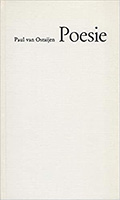
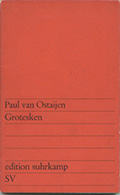
Avant-Garde
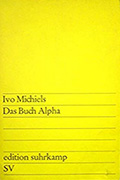
In the 1960s, it was quite an honor to be published by Suhrkamp. The so-called ‘consumer translations’ (Joosten & Vaessens, 2011) appeared with other publishers. Moreover, Suhrkamp had a particular interest in the avant-garde. Thus, it was not easy to be included among Suhrkamp's titles. Nevertheless, in the mid-1960s Georg Hermanowski managed to place two titles with Suhrkamp: So hat es begonnen [This is How it Started] (1966) by Paul de Wispelaere and Das Buch Alpha [The Book Alpha] (1965) by Ivo Michiels. In the 1960s and 1970s, Georg Hermanowski, Suhrkamp's first professional adviser in the field of Dutch literature" (Zajac, 2014, p. 10 ), also tried to place other authors at Suhrkamp, but his attempts did not lead to the desired result. Through Hermanowski, Ivo Michiels got in direct contact with the head of the Edition Suhrkamp, Günther Busch, but to no avail. Nothing came of Hermanowski's plan to place Michiels' entire Alpha Cycle with Suhrkamp. After the publication of Orchis militaris, no more titles by Michiels followed at Suhrkamp.
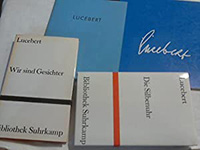
This, however, did not mean that there was no more interest in the avant-garde from the Dutch language area at Suhrkamp. In 1972, Suhrkamp published Wir sind Gesichter [We are Faces], a collection of poems with drawings by the "undisputed master" (Van de Watering, 2011) of the Vijftigers, Lucebert. At the time Lucebert and Unseld also developed a private relationship. It was probably this tie that led to Siegfried Unseld, who at the time had no outspoken interest in the literature of the Netherlands and Flanders (Zajac, 2014, p. 12), to includes a second anthology by Lucebert in the Bibliothek Suhrkamp Die Silbenuhr [The Silver Watch].
Nothing to lose and yet fear

That Unseld did not really have a big interest in the literature of the Dutch-speaking world is evident from the publications of the 1970s. Except for Lucebert no further works of the avant-garde were published, only Felix Timmermans and Ernest Claes. Apparently Suhrkamp wanted to drive on the success these authors had had with Insel. And not without reason: Timmermans Pallieter was reprinted three times as Suhrkamp-Taschenbuch.
A very special publication in the late 1980s was the translation of Renate Rubinstein's Niets te verliezen en toch bang (Nichts zu verlieren und dennoch Angst, 1980). This book was recommended by the sociologist Norbert Elias, who also wrote the preface for the translation.
“Elias believed that Rubinstein deserved the same degree of international recognition enjoyed by Susan Sonntag, and he asked for the text to be edited in such a way as to secure the best possible sales“ (Zajac, 2014, p. 12)
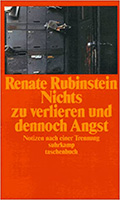
Unseld, who primarily wanted to publish the book by Rubinstein as an inexpensive pocketbook, gave the notations of Rubinstein an honorary placement in the Neue Folge of the Edition Suhrkamp. Reviewers reacted tentatively:
"Not all of Renate Rubinstein's aphorisms unveil the ultimate truth, not all of her sketches are skillful, Sometimes she writes out of her resentment, which she tries to cover up with irony in other places. [...] This does not diminish the value of a book, that is said to help its readers. And that in a good, never old-fashioned way." (Endres, 1980)
And apparently the book did indeed help. Nichts zu verlieren und dennoch Angst was reprinted three times. This was reason enough for Suhrkamp to publish more of Rubinstein's work. In 1986, Immer verliebt was published, in 1987 Rubinstein's Notizen ihrer Krankheit (Sterben kann man immer noch) and in 1993 Rubinstein's "Denkmal" einer geheimen Liebe, Mein besseres ich.
Great variety
Rubinstein's success apparently aroused curiosity. In the 1980s and the early 1990s, a whole range of works by new authors were published by Suhrkamp: a collection of stories by Jacobus Maarten Biesheuvel, the first translation of Maarten 't Hart for a major German publisher (Ein Schwarm Regenbrachvögel 1988), an anthology of poetry by Martinus Nijhoff (Die Stunde X, 1989), Quissama (1990) by F. Springer, Eine teure Freundschaft by Thomas Rosenboom and the first book by A. F. Th. van der Heijden. These publications were followed by books by Hermin de Graaf, Willem Elsschot, J. Bernlef, Marcel Möring, Harry Mulisch, Hella Haasse, Marcel Möring, Marente de Moor and Gerbrand Bakker.
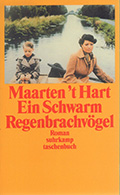
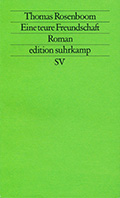
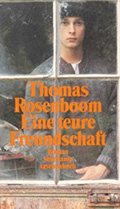
In the 1980s, Suhrkamp had a very varied selection of literature from the Netherlands and Flanders, but none of these authors achieved great successes, these were limited to Cees Nooteboom and A. F. Th. van der Heijden.
Cees Nooteboom
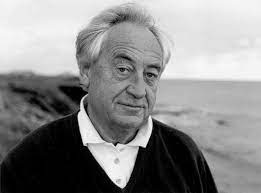
Although Cees Nooteboom’s carrier developed equally difficult at first as that of Claus and Mulisch, more than 260 publications of Cees Nooteboom appeared in the German language area by now.
The first translation of Nooteboom's work in Germany, Das Paradis ist nebenan [Philip and the Others] (1958), went unnoticed. Things went hardly different with Rituale [Rituals] which appeared almost 30 years later (1984) with Volk und Welt.
It was only after the publication of Berliner Notizen [Berlin Notes] (1991) that Nooteboom became a household name. At the time the author was staying in Berlin on a grant from the DAAD [German Academic Exchange Service] and closely followed the 'fall of the wall'. Excerpts from his book, that was going to be published with Suhrkamp, were regularly published in the Berlin newspaper Die Tageszeitung. Nooteboom was the talk of the town.
And then the unexpected happened. When the wall fell, Cees Nooteboom was staying in Berlin. He followed the "fall of the wall" closely. Excerpts from his book that was to be published by Suhrkamp were regularly published in the Berlin newspaper Die Tageszeitung. Nooteboom was the talk of the town.
Nootboom's absolute breakthrough was sealed not by the award of the Literaturpreis zum 3. Oktober but by a comment of Marcel Reich-Ranicki about his novella Die folgende Geschichte on the television program Das literarische Quartett. Reich-Rancki was convinced: Nooteboom is one of the great European authors.
Within a few weeks, more than 80,000 copies of Die folgende Geschichte had been sold!
Since then, Suhrkamp has published translations of Nooteboom's entire oeuvre. In his Gesammelte Werke [Complete Works] (10 volumes) one finds an entire series of texts that previously had not been published in German. In addition, Suhrkamp published Nooteboom's fictional prose as Quarto-Band (Romane und Erzählungen [Novels and Short Stories]) in 2013.
A. F. Th. van der Heijden
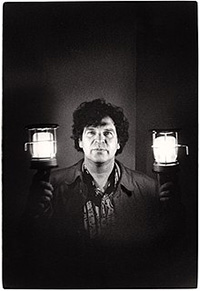
Suhrkamp had less success with Thomas Rosenboom. Rosenboom debuted at Suhrkamp with Eine teure Freundschaft in 1991, and also Rosenboom's second German translation of a novel, Das Liebeswerk (2000), appeared with Suhrkamp. But after that Rosenboom chose a new publisher.
The translation of his bestseller Publieke werken [Public Works] appeared with the Deutsche Verlagsanstalt (Neue Zeiten, 2004). Suhrkamp had more success with the second protégée of Nooteboom, A.F.Th. van der Heijden. Like with Rosenboom, Van der Heijden's first book appeared at Suhrkamp in the early 1990s. A new translation of Van der Heijden’s work followed at Suhrkamp almost annually. He was the new star.
"In his literary approach to time, his play with total memory, his attempt to take possession of the whole world through writing, van der Heijden has often been compared to Marcel Proust. [...] When asked about this, he says. "I fear Proust. I fear Joyce. They have taken the novel so far that there is no going back from there. But one must be able to return from there. My literature is perhaps in a in a constant conflict between modernity and convention." (Bartels, 2007)
Not all of Van der Heijden's titles were as successful as Der Antwalt der Hähne, which has been reprinted more than five times by now. Despite this, Suhrkamp's choice of A. F. Th. van der Heijden was the right one. Next to Nooteboom, Van der Heijden is one of the great authors from the Dutch language area among Suhrkamp's titles now.
A New Start
In the last twenty years, Suhrkamp's selection of Dutch literature titles has changed again. Suhrkamp's general interest for literature from the Netherlands and Flanders has remained, titles by new authors from Flanders and the Netherlands appear with great regularity. Events like the Frankfurt Book Fair with the participation of Flanders and the Netherlands as guest of honor have played an important role in this. But Suhrkamp is primarily not interested in singular successes, when they are convinced of an author they try to translate the entire oeuvre. This was very successfully done with the work of Gerbrand Bakker.
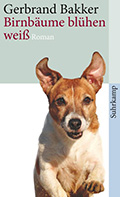
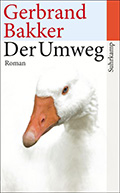
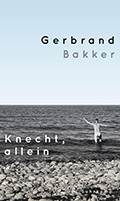
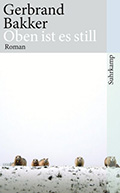
Suhrkamp's selection of literature from the Netherlands and Flanders is very varied. In the beginning the focus lay on the avant-garde, but now, after a bit of a search, Suhrkamp has good contacts in the Dutch language area and successful titles that illustrate the quality of literature from the Netherlands and Flanders.
(Herbert Van Uffelen)
References
B.K.: Straßen-Romanze - Roman eines jungen Holländers. In: Christ und Welt, Vol.: No. 39, Issue: 25. Sept. - Stuttgart, (1958).
Bartels, Gerrit: Am Gängelband der Zeit: Luftnot und Literatur. Eine Begegnung mit A.F.Th. van der Heijden, dem Proust der Niederlande.In: Der Tagesspiegel, Vol.: 24-10-2007, Nr. 19706 (Rubrik: Kultur), (2007) - p. 23
Joosten, Jos / Vaessens, Thomas: Warum kennt uns keiner? In: literaturkritik.at, Issue: 27. mar. (2011). (https://www.uibk.ac.at/literaturkritik/zeitschrift/863186.html)
Van de Watering, C.W.: Zwischenbilanz. In: Planetlyrik.de, Issue: 3. Dez., (2011)(http://www.planetlyrik.de/lucebert-die-silbenuhr/2011/12/)
Zajas, Paweł: Befor the 'Nooteboom Effect' - Dutch Literature at the Suhrkamp Publishing House. In: In: Journal of Dutch Literature, Vol.: 5, Issue: 2, (2014) - p. 1-22
